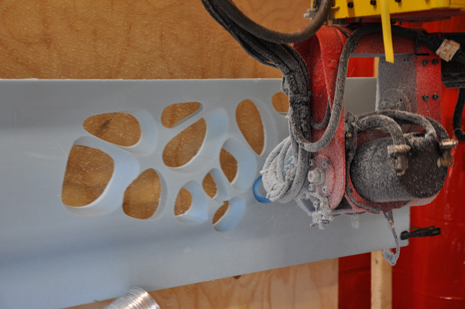
FAYETTEVILLE, Ark. – The University of Arkansas Honors College has awarded eight grants to help develop new honors courses on cross-disciplinary topics ranging from nanotechnology to childhood obesity. The grants total more than $160,000 and will support faculty teams drawn from across campus.
“The Honors College wants to bring faculty and students together from all colleges to explore big issues, and these grants provide a way to make that happen,” said Bob McMath, dean of the Honors College. “These courses will significantly expand the horizons of our students.”
The Honors College has previously provided seed funding for 12 interdisciplinary honors courses and three research experiences, many of which are flourishing today. Classical studies professor Dave Fredrick was part of a team that received funding for “Visualizing the Roman City,” a colloquium that sent anthropology, architecture, classical studies and geosciences students to Ostia, an ancient port city of Rome, to take laser scans that they later converted into virtual reconstructions.
“That Ostia course keeps on giving,” Fredrick said. “It spawned Digital Pompeii, which I’ve taught for four semesters, and a grant-funded colloquium on game design.” He added that six students have won grants based on research stemming from the course, and he is currently working with an interdisciplinary team on a grant proposal to explore the relation between space and decoration in Pompeii, building on the visualization approaches used in the Ostia course.
 Heather Hudson, Sarah Brutesco, and Caitlin Stevens, conduct laser scans of Ostia Antica, as part of an interdisciplinary course that was developed with grant funding from the Honors College. |
“The real value of the Ostia course,” he added, “was that it brought together faculty and students from different backgrounds, with disparate skill sets, who might not have worked together otherwise. It really was interdisciplinary.”
The courses and faculty teams selected for funding this year include the following:
Childhood Obesity: Context and Prevention
Faculty: Mardi Crandall, Cindy Moore, Vernoice Baldwin, human environmental sciences; Michael Thomsen and Rodolfo M. Nayga Jr., agricultural economics and agribusiness.
Description: Childhood obesity, which affects almost one-fifth of all children in the United States, will be addressed from multiple perspectives, including child development, nutrition, health behavior, economics and marketing. In the culminating experience of the course, multidisciplinary teams of honors students will develop action plans that address aspects of child obesity and present them to an audience of community leaders and professionals in the field.
Computational Craft: The Algorithmic Generation of Form
Faculty: Santiago Perez, architecture; and Russell Deaton, computer science and computer engineering.
Description: In Computational Craft, honors students will learn to code computer software to generate forms or patterns, and will then fabricate tangible works of art and sculpture featuring these forms. Their work will be featured in an exhibition at the end of the term.
Digital Antiquity
Faculty: Jesse Casana, anthropology; and Jackson Cothren, Center for Advanced Spatial Technologies.
Description: Digital Antiquity will offer honors students the chance to explore advanced problems in archaeology while learning sophisticated methods in three-dimensional modeling and visualization. Through the Center for Advanced Spatial Technologies, students will participate in ongoing research projects ranging from an effort to map ancient roadways in New Mexico’s Chaco Canyon to a discussion of ancient city planning informed by data from an Iron Age site in Turkey.
Educational Equity: A Cross-Disciplinary Approach
Faculty: Robert Maranto, education reform; Luis Fernando Restrepo, world languages, literatures and cultures; and Patrick Stewart, political science.
Description: The gap in equality of learning across ethnic and class lines is a critically important issue in public policy, and among the most contentious. This course will introduce honors students to a wide range of perspectives and proposed solutions, and will expand beyond the classroom through a field trip to an area school that has increased social and educational equity and through a service learning experience in one such school.
Foreign Trade and International Order: History, Policy, and Theory
Faculty: Liang Cai, history; Jingping Gu, economics; and Ka Zeng, political science.
Description: This honors course will explore the relationship between China’s foreign trade and the world order, beginning with China’s dominant position in world trade before European hegemony and extending through the Cold War and into our own time.
Integrating Nanotechnology into Honors Education
Faculty: Min Zou, Steve Tung, and Adam Huang, mechanical engineering; Gregory Salamo, physics; Donald Roper, chemical engineering; Jingyi Chen, chemistry and biochemistry; and Jin-Woo Kim, biological engineering.
Description: Nanotechnology holds tremendous promise for new applications in a wide range of industries, from consumer goods and electronics to medicine. The professors collaborating on this project will engage honors undergraduates at all levels, from nanotechnology modules for freshmen and sophomore classes to hands-on research opportunities for juniors and seniors.
Music, Language, and Thought
Faculty: Elizabeth Hellmuth Margulis, music; Jack C. Lyons, philosophy, and Douglas A. Behrend, psychology.
Description: Music and language are two distinctively human capacities, both of which seem to be closely linked to our capacity for thought. The exact nature of this link, however, is still somewhat uncertain. The course will combine critical reading and discussion and creative project-based learning to train honors students to think rigorously and analytically about such humanistic topics as music, poetry and human nature.
Social, Economic, and Computer Networks
Faculty: Jingxian Wu, electrical engineering, and Kathy Fogel, finance.
Description: This course will introduce honors students to the science, technology and theory guiding the evolution and operations of networks ranging from international economic networks to Facebook and LinkedIn. Interdisciplinary teams will envision business applications of networks, some of which just might turn into real entrepreneurial opportunities.
Faculty members plan to begin offering these courses in the 2012-13 academic year. For more information on individual courses, visit the Honors College website.
Topics
Contacts
Bob McMath, dean
Honors College
479-575-2089,
Kendall Curlee, director of communications
Honors College
479-575-2024,